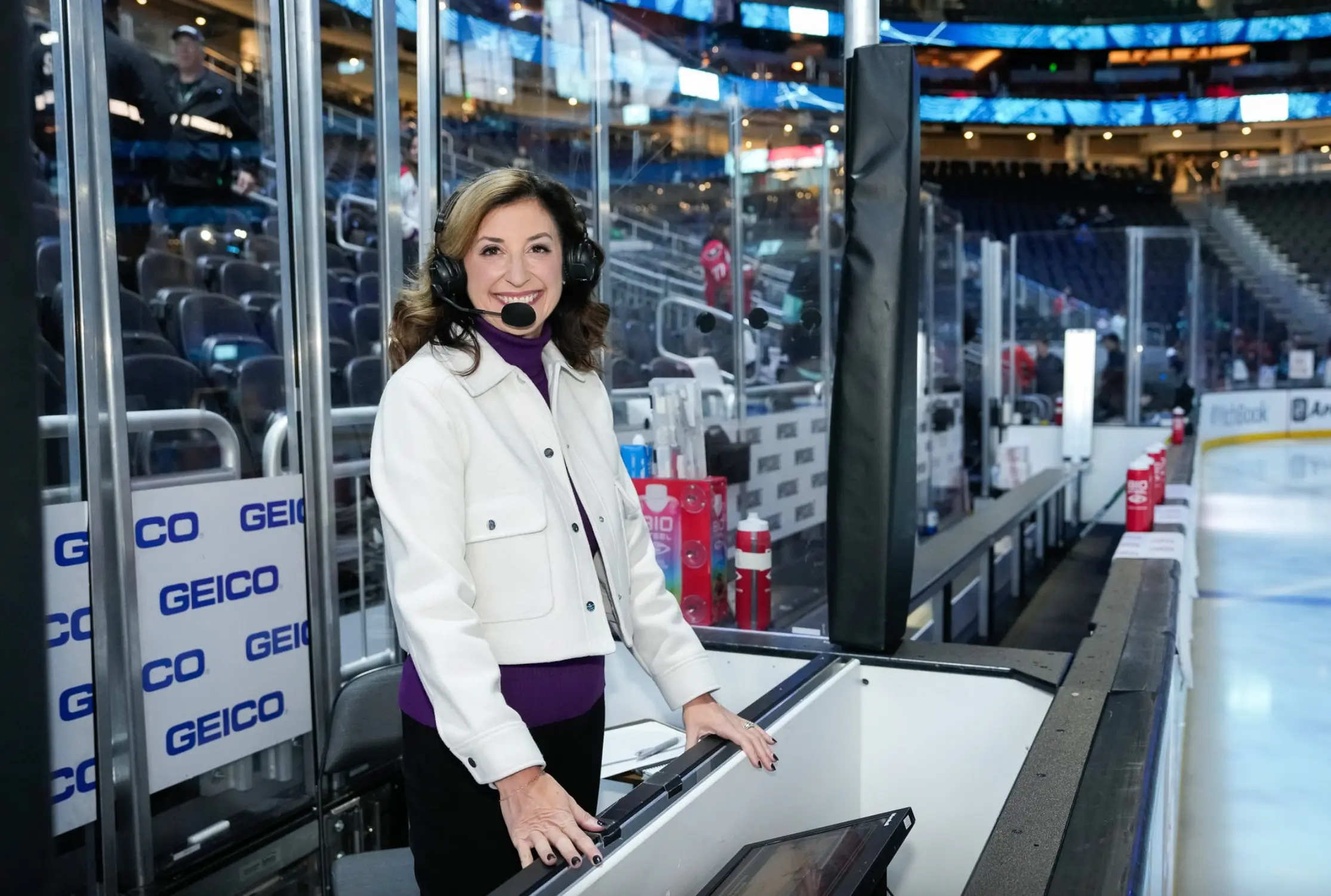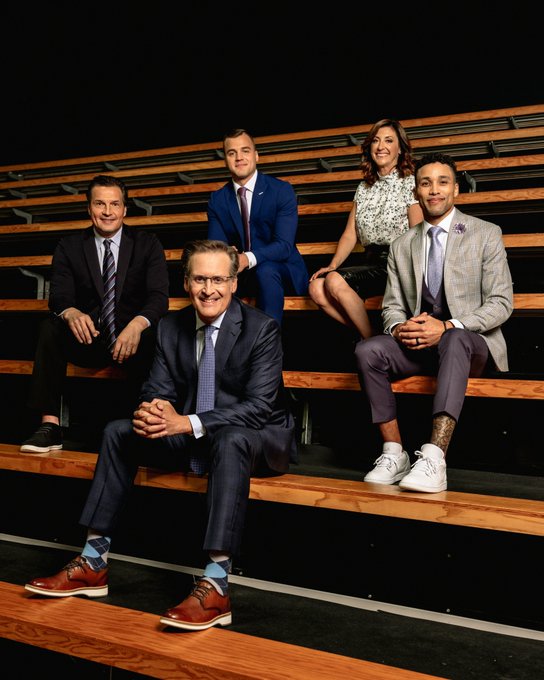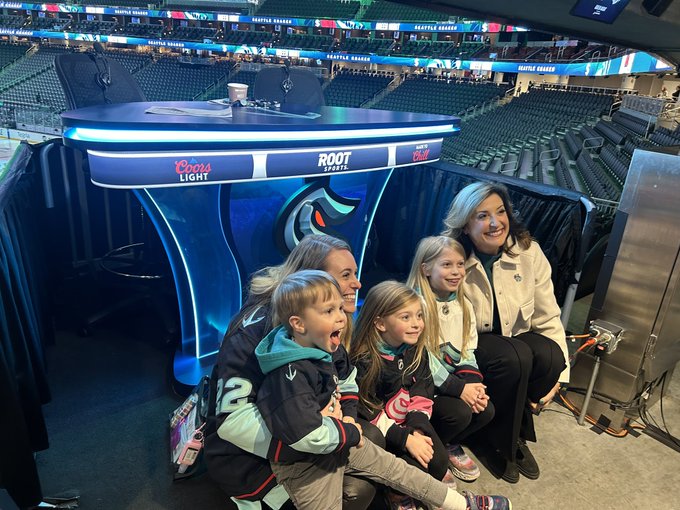Full of Firsts: How hockey analyst Alison Lukan inspires through data-driven storytelling

This article was written by Silvia Leija Rosas, who is part of the Professional Hockey Writers Association x To Hockey With Love Mentorship Program. This program pairs aspiring writers with established members of the association across North America to create opportunities for marginalized people that do not traditionally get published on larger platforms covering hockey.
To Hockey With Love is a weekly newsletter covering a range of topics in hockey – from the scandals of the week to providing a critical analysis of the sport.
_____
Alison Lukan remembers the moment clearly, standing at ice level in the player tunnel as fans roared, hands pounding against the glass as the final horn signaled the end of the game. It was April 6, 2023, and the Seattle Kraken had clinched their first-ever playoff berth in front of their home fans at Climate Pledge Arena.
Clinching that playoff berth was another accomplishment added to a growing list of firsts for the Kraken in just their second year of existence. Lukan is among them as the team’s first female broadcaster while successfully weaving analytics into her coverage. And that’s in addition to her work as one of three co-hosts of the Too Many Men podcast, a popular, all-female hockey podcast.
“What’s so cool about being part of the Kraken right now is that we are part of every single first and that was a really cool first to be a part of,” Lukan said.
What makes that moment — and her hockey media career — more surreal is that years earlier, Lukan wasn’t even interested in hockey. During Lukan’s childhood in her home state of Ohio, she was a spirited fan of another sport and was only introduced to hockey through her father.
“I’m from the Midwest, so I grew up watching football and loving football but my dad had these weird-looking skates,” Lukan said. “I didn’t know what they were. I knew my dad had played this game called hockey, but really, the only sport that was accessible easily was football.”
Lukan graduated from the University of Richmond with a Bachelor’s degree in Leadership Studies before spending the next 20 years as a corporate consultant. While Lukan traveled for work, she followed the Tampa Bay Lightning and the Washington Capitals. But it was when she moved home to Ohio that she started writing about the Columbus Blue Jackets.
“I was crazy enough to say, ‘Hey, this is fun,’” Lukan said. “I was like, ‘Oh, I’ll have a blog,’ and it all kind of took off from there.”
Lukan blogged about the Blue Jackets and taught herself to use numbers and data, diving headfirst into the world of analytics.
“I came to realize, as I was getting more passionate about analytics, that if I wrote things with numbers, no one could tell me I didn’t know what I was talking about,” said Lukan.
Through her work, Lukan found a community of fellow data analysts who disrupted the narrative of hockey journalism by pushing more statistics to the forefront of the sport. The more she learned, the more her career progressed. After covering the Blue Jackets part-time for Fox Sports Ohio, Yahoo! Sports, and other outlets, Lukan covered the team for The Athletic, joining the online publication in 2017, where she frequently used analytics in her coverage.
Lukan also traveled across the United States to attend sports analytics conferences and even organized one for the Columbus Blue Jackets alongside assistant general manager Josh Flynn. Through these conferences, Lukan wanted to learn from her peers about what the numbers were saying about the game. And it only helped her as she tried to explain those numbers to her audience.
“I am not going to walk into a locker room and say, ‘You know, your Corsi was this, what do you think that says about your team?’” said Lukan. “I’m going to do the work to translate what the numbers tell you.”
A two-step system: data-driven storytelling
Lukan credits her understanding of analytics to members of the sports analyst community. She lovingly refers to them and herself as “the nerds,” making data more accessible for the public to consume. However, Lukan feels some data is presented with too much emphasis on numbers and not enough on what they represent.
“When we do that, we run the risk of opening ourselves to the criticism of people who don’t believe because it’s like, ‘See, your numbers are stupid. That’s clearly not what’s happening,’ ” Lukan said.
Lukan believes the first step in using data responsibly is to educate and put those numbers into context about a player, a game and the team they play for. The second step is storytelling, surrounding the data with the bigger picture. If Lukan talks to a coach or player about a statistic and they push back on her interpretation, that disagreement should be part of the story.
“It’s using data as a foundation. But the work is really in understanding and translating. So that information [and] what it taught us can now be comprehended by the audience.”
Shayna Goldman, staff writer for The Athletic, said Lukan has set the gold standard for blending numbers, visuals and anecdotes to make everything so digestible.
“I think anybody that does this work should be tipping their cap to something that [Lukan’s] done,” Goldman said. “Because she does it in such a way we should all strive toward.”
Lukan entered the sports media space through analytics. But she has since grown into a personality who can interpret advanced statistics and speak out about issues within the sport’s culture.
Way too many men
Lukan’s passion for numbers grew out of a need to prove herself. The Too Many Men podcast was born out of frustration that many people weren’t willing to listen to women who proved themselves already.
Lukan, Goldman and Bleacher Report contributor Sara Civian, who came up with the name for the podcast, took their frustrations out of their group chat and onto the podcast scene just as hockey came to a stop due to COVID-19.
“It felt like there was such a void in the grand scheme of hockey podcasts and hockey coverage for just women talking about the game,” recalled Goldman. “Especially people who weren’t afraid about touching on the tougher topics surrounding hockey culture.”
Lukan takes pride in her podcast knowing she and her co-hosts can provide new ways to discuss hockey while holding the sport and its participants accountable. In the last four years, the Too Many Men co-hosts have broken down everything from goal songs and the salary cap, to the Canadian World Junior team investigation.
“It’s very important to us that we call out things [when] we see our people getting away with something that maybe someone else wouldn’t under the guise of hockey,” said Lukan. “We love this game, we want it to be at its best. And that means that we don’t excuse behavior that shouldn’t give people permission and privilege to play this great game.”
Lukan says she is no longer afraid to speak out against the toxicity that poisons hockey culture, especially when it marginalizes voices like Lukan’s and her co-hosts’.
“Using your voice for someone else who maybe can’t, is important,” Lukan said.
“We had a star in our midst”
The first time Ross Fletcher met Lukan, it was the day she auditioned for the Seattle Kraken’s pre and post-game shows on ROOT Sports. It was the first time he had ever seen anyone nail a screen test on their first try.
“We knew from that moment that we had a star in our midst,” said Fletcher, Lukan’s co-host.
Lukan did a few more screen tests, just in case it was a one-off, but she ended up being the perfect person for the job.
Last year, NHL fans ranked the Seattle Kraken broadcast as number one in The Athletic’s annual broadcasting rankings, something Fletcher said can easily be credited to Lukan’s ability to make her analytics accessible and digestible.
That’s Kraken Hockey Baby! 🎤 We’re so proud of our amazing #SeaKraken broadcast team who was voted number one in @TheAthletic’s annual broadcast rankings voted on by @NHL fans → bit.ly/NHLBestBroadca…
Fletcher adds that it’s been rewarding seeing girls and women come up to Lukan at Climate Pledge Arena to thank her during games over the last three seasons.
“They come up to the desk and say to Alison, ‘You’re the reason why I’ve become interested in hockey,’ ” Fletcher said. “We are so grateful for your representation and for what you do. Thank you for your work.’”
One of the best parts of this job over the last three years has been watching first hand the number of people who come up to @AlisonL on our tv set pre game and tell their story of how she’s inspired them to get in to hockey. Just brilliant.
When prompted to answer what three words describe Lukan the best, after a long minute of deliberation, Fletcher replies with smart, trailblazing and inspirational.
“She is doing things on TV that barely anyone else is doing, or I think even is capable of doing,” Fletcher said.
Lukan, who described herself as tenacious, deliberate and non-judgemental, praises colleagues like A.J. Mleczko, Cassie Campbell and Kendall Coyne Schofield who paved the way for other female hockey broadcasters like herself.
“I want to make sure we respect those tremendous women who are out there,” Lukan said.
Unlike the female broadcasters who came before her, though, Lukan has never played the game at a significant level. Yet, with her knowledge and presentation of the sport, it is impossible to tell.
“It’s so groundbreaking what she’s doing,” said Goldman, who described Lukan as innovative, brilliant and a mentor. “It’s unbelievable to see because 10 years ago, you wouldn’t have seen it. I just hope it leads to more.”
_____
More from the PHWA x To Hockey With Love Mentorship Program
- Taking the next step: Landon Slaggert’s journey from Notre Dame star to next NHL hopeful
- The fight for ice: How Canada’s female minor hockey programs overcome the old boys’ club
- NIL, transfer portal leading to new era of college hockey
- Meet the best prospect you’ve never heard of: Lou Lévesque’s unlikely fast-track to a top role on a top team
- ‘This is my dream, so I want to fight for it’: On the battle to reach the NHL – and then stay there
- ‘It opened a lot of doors for me that I didn’t see’: How Sidney Crosby’s Little Penguins sparked hockey aspirations for women in Western Pennsylvania
- Across the Pacific: Jordan Spence’s journey to the NHL
- ‘No one thought he’d make it’: How Alex Laferriere fought his way to the Los Angeles Kings
- Lasting Impact: How Jon Merrill’s LGBTQ+ allyship prevails

